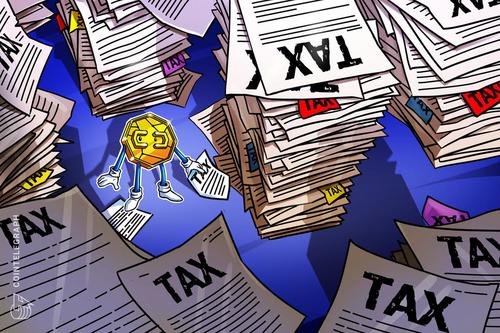"Not A Drill": Infrastructure Bill Could Sink American Crypto Industry
Authored by Jeff John Roberts via Decrypt.co,
The government aims to partially cover the cost of a massive infrastructure bill by taxing crypto companies... and the entire industry will feel it.
Things just got ugly for crypto in Washington, D.C.
For years, the threat of major regulation has been raised like a hammer, ready to smash the crypto industry. Now, the hammer is ready to drop in the unlikely form of a major infrastructure bill in the U.S. Senate.
"This is not a drill," writes Jake Chervinsky, an influential crypto lawyer and a sober voices in a hype-prone industry. In a must-read Twitter thread, Chervinsky explains how the $550 billion bill - which is primarily about roads and bridges - could shiv American crypto companies.
The pain comes in the part of the bill that explains how the U.S. will help pay for those roads and bridge. Namely, the bill states that Uncle Sam plans to cover $28 billion of the costs by squeezing crypto brokers.
The trouble is that the bill defines "broker"—a term normally used to describe the likes of Coinbase and Robinhood—as basically any business that touches crypto.
As Chervinsky writes,
"This definition is so broad, it could apply to nearly every economic actor in the US crypto industry, if read literally."
The catch-all "broker" term could apply to miners, DeFi startups, and others who will have to file customer forms with the IRS, a task that is in some cases impossible.
The upshot is that the U.S. crypto industry is in the same position as the online gambling industry a decade ago when Congress regulated it out of existence. In the eyes of lawmakers, crypto companies—like online casinos—appear to be both sinful and rich, which makes them the perfect target for a revenue raid.
The difference, of course, is that crypto is not a new form of vice to be taxed but rather a world-changing technology like the Internet. Sure, it has enabled bad stuff (including gambling-like behavior) but the Internet did too, and U.S. lawmakers came around to realize it made strategic sense to build the web on American shores rather than driving it out of the country.
There is also the matter of that $28 billion of taxes the crypto industry is supposed to provide. How did the Senate arrive at that figure? No one really knows, but that's not the point. The point is for Congress to conjure up numbers that will "pay" for roads and bridges, and taxing crypto "brokers" offers a way to do that.
If you think that this is just another regulatory bogeyman that will never happen, think again. The crypto broker provision is part of a larger $550 billion package that is poised to pass, and that President Biden is aiming to make the landmark accomplishment of his first year. If the U.S. crypto industry has to become road kill to make that happen, few in Washington will bat an eye.
All of this reflects poorly on U.S. elected officials, but the crypto industry bears responsibility too. For years now, the industry's leaders have carried on like they're too rich or too cool to be bothered with Washington DC. Now, that's coming back to bite them. Meanwhile, the handful of companies who are making a serious effort to help crypto build political capital get branded with the c-word ("centralized") and dumped on by others in the industry. That's what happened to Uniswap, which is probably the most promising DeFi project, when it it recently dared to devote some of its budget to defend crypto in the Capitol.
For now, everything is not lost. One Washington insider—who describes the situation as a "live fire exercise"—tells Decrypt the industry has mobilized like never before and various factions are putting aside differences to fight a common threat. But she added that "we're running out of cards to play" as Democrats pull out the stops to pass the infrastructure bill by August. Ironically, the crypto industry's best hope could be other Democrats—namely, the progressive caucus threatening to blow up the entire bill unless their leaders pass a related bill full of left-wing spending goodies.
In the absence of a Democratic party crack-up, the crypto industry's best hope is a long-shot bid to rewrite the broker language before the bill takes another step forward. Barring that, Chervinsky notes that the next step will be fighting a rear-guard action in the courts, and urging allies in Congress to prevent the worst parts of the law decapitating the industry when it goes into effect in 2023.
The bottom line is that this regulatory storm has been brewing years. The crypto industry should have done more to head it off. Now, it may be too late.
https://ift.tt/3fcFTMz
from ZeroHedge News https://ift.tt/3fcFTMz
via IFTTT


0 comments
Post a Comment